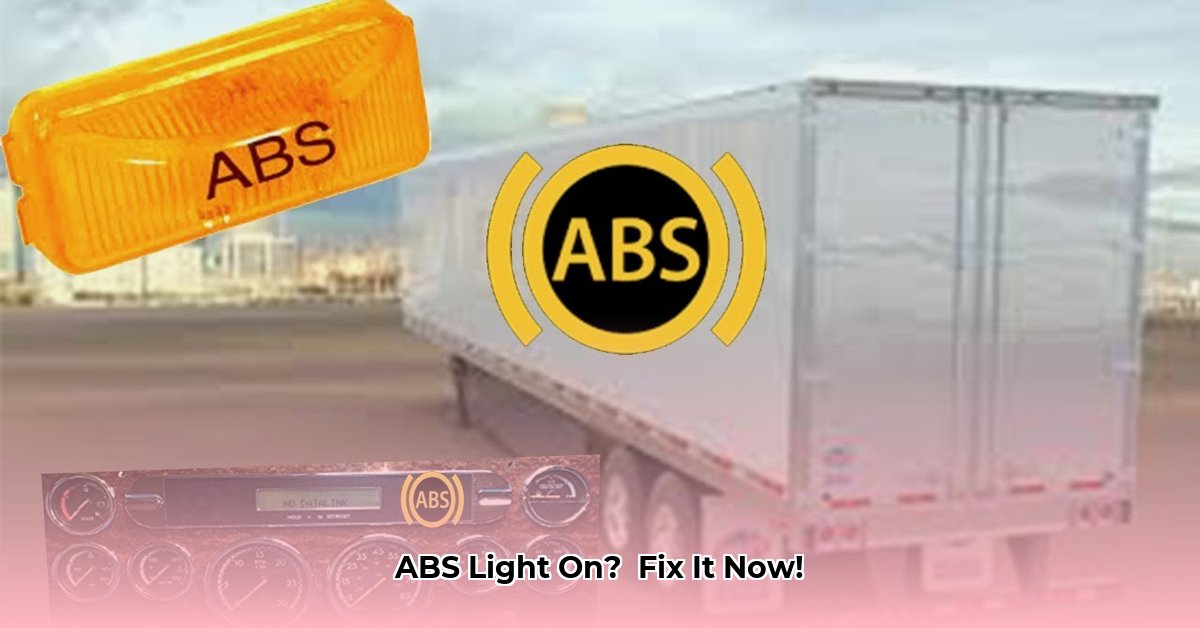
Seeing that flashing ABS light on your trailer is more than just annoying; it's a serious safety and legal concern. This guide provides a step-by-step approach to troubleshooting and fixing the problem, ensuring you stay safe and compliant with Department of Transportation (DOT) regulations. We'll cover common causes, diagnostic procedures, and preventative maintenance strategies.
Understanding the Trailer ABS System and Warning Lights
Your trailer's Anti-lock Braking System (ABS) is a crucial safety feature preventing wheel lockup during hard braking, enhancing vehicle control and reducing stopping distances. When the ABS warning light illuminates—whether steadily lit or flashing—it indicates a malfunction within the system. Ignoring this warning compromises safety and violates DOT regulations.
A malfunctioning ABS system significantly increases the risk of accidents, potentially causing serious injury or property damage. Moreover, operating a vehicle with a known ABS fault exposes you to hefty fines and potential out-of-service orders from DOT inspections.
Common Causes of a Trailer ABS Warning Light
Several factors can trigger the ABS warning light. These range from simple, easily rectifiable issues to more complex problems requiring professional attention:
Wheel Speed Sensors: These sensors monitor wheel rotation. Dirt, damage, or corrosion can disrupt their function, triggering the warning light. Think of them as the system's "eyes"—if they're impaired, the system's performance suffers.
Wiring Issues: Damaged, corroded, or loose wiring within the ABS system can interrupt electrical signals. A thorough inspection of the wiring harness is crucial for diagnosis.
ABS Control Module: The ABS control module is the system's "brain," controlling all aspects of the ABS operation. A malfunctioning module requires professional diagnosis and repair.
Hydraulic System Problems: Leaks or blockages in the hydraulic components can affect the ABS system's function. Regular fluid level checks are essential to prevent this.
Low Battery Voltage: Surprisingly, a low battery charge can sometimes disrupt the sensitive electronics of the ABS system. Check the battery voltage as a simple first step.
Troubleshooting Your Trailer ABS Light: A Step-by-Step Approach
Addressing the ABS warning light requires a systematic approach, starting with simple checks and escalating to more advanced diagnostics as needed. Remember, safety should always be your top priority.
Visual Inspection: Begin with a thorough visual inspection of the wiring and connectors associated with the trailer's ABS system. Look for broken, frayed, or corroded wires, loose connections, and any signs of physical damage to the wheel speed sensors. Cleaning dirt and debris from sensors can resolve the issue in many cases.
Power and Ground Checks: Use a multimeter to verify that the ABS module is receiving proper power and a good ground connection. An incorrect voltage reading indicates a wiring fault.
Diagnostic Scan: Employ a heavy-duty diagnostic scanner compatible with your trailer's ABS system. This provides specific error codes, precisely pinpointing the faulty component. These scanners are a worthwhile investment for professional drivers. (Note: Always consult your trailer's manual or a qualified mechanic to ensure you use the correct scanner and interpret the codes correctly.)
Professional Diagnosis: If the initial checks and diagnostic scan don't reveal the problem, or if the issue seems complex, seek the help of a qualified heavy-duty mechanic. They possess the expertise and tools necessary for a thorough diagnosis and repair of the ABS system.
Preventative Maintenance: Keeping Your ABS System in Top Shape
Proactive maintenance is critical for preventing ABS malfunctions and the associated safety and legal ramifications. Regular preventative measures extend the life of your system and minimize the risk of unexpected failures:
Regular Inspections: Incorporate a comprehensive ABS system check into your routine pre-trip and post-trip inspections. This includes visual inspections, wire checks, sensor cleaning, and fluid level checks.
Sensor Cleaning: Regularly clean the wheel speed sensors to remove dirt, debris, and corrosion. This simple task can prevent many problems.
Wiring Integrity: Periodically inspect the ABS system wiring harness for any signs of damage or wear. Address any problems promptly.
Hydraulic Fluid Checks: Maintain proper hydraulic fluid levels in the ABS system. Low levels or leaks indicate a potential problem.
Consistent preventative maintenance is the most effective strategy to avoid costly repairs, ensure safe operation, and maintain DOT compliance.
Legal and Regulatory Compliance: Understanding the Rules
Operating a commercial vehicle with a malfunctioning ABS system is a serious violation of DOT regulations. Penalties can include significant fines, out-of-service orders, and even legal repercussions. Regular maintenance and prompt attention to warning lights are essential to avoid these issues.
Key Takeaways:
- A malfunctioning ABS system is a serious safety and legal concern.
- Troubleshooting involves visual inspection, electrical tests, and potentially professional diagnostics.
- Preventative maintenance is crucial for avoiding problems and maintaining DOT compliance.
- Ignoring warning lights can lead to serious consequences.
This guide provides actionable steps and information to ensure your trailer's ABS system functions correctly, maintaining your safety and DOT compliance. Remember, prompt action is always the most responsible approach.